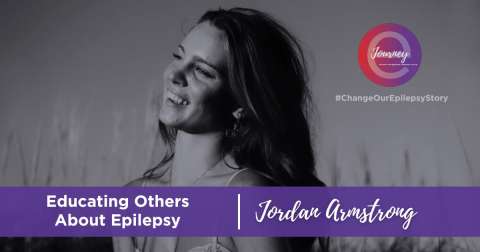Educating Others About Epilepsy

By Jordan Armstrong , Massachusetts
Person with EpilepsyThursday, November 30, 2023
I was 22 years old when I was diagnosed with epilepsy. In January 2022, I woke up with what felt like a severely swollen tongue, blood on the pillow next to me, and what appeared to be a rash on my face and neck. I went to urgent care and was told to make an appointment with my primary care physician, which I did. My primary care doctor diagnosed what happened as an allergic reaction, but it wasn't. It was a tonic-clonic seizure, although I would not find that out until weeks later.
As a recent Berklee College of Music graduate, I spent the next few months preparing to move from Massachusetts to Tennessee for music. In March, a week after driving a thousand miles to Nashville, I woke up to the same scene I had in January. A bitten tongue, blood on my sheets, and popped blood vessels on my face and neck. I immediately went to urgent care and was sent to the emergency room. A few days after that, I had an EEG and neurology appointment, where they found seizure activity immediately, and I was diagnosed with epilepsy.
I lost my license and ability to live alone. My family split up the weeks staying with me in Nashville until I could break my lease and move back to Boston, where I had a support system and access to public transportation. It was strange to get an epilepsy diagnosis later in life. My mom had epilepsy as a child and stopped having seizures when she was 22. So, it is almost unbelievable that that is when I began to have seizures. I am lucky to have someone in my corner, my mom, who uniquely understands what I am going through.
I had a difficult time getting used to telling people about my epilepsy. Especially people I had known my entire life. I didn't want anyone to be scared that I may have a seizure. I learned as time went on that the best you can do is try to make people aware and give them the tools to help if you have a seizure. Learning and sharing information is critical. Becoming an Epilepsy Awareness Ambassador has been amazing, not just because I get to help educate others but because I have become more educated on epilepsy and seizure first aid.
I would recommend to anyone newly diagnosed to seek out someone with epilepsy. While family and friends can be supportive, comprehending what you feel inside is still hard for them. It felt so odd to have to add epilepsy to my identity. It doesn't have to be your whole identity, but you must make people aware of it for safety reasons, which can be overwhelming because you feel you are putting pressure on others just by existing.
I have been seizure-free for a year and have moved back to Nashville. I am diligent about my medication and managing my stress levels. My biggest seizure trigger is stress, so going to therapy and ensuring I get eight hours of sleep every night is very important.
Epilepsy is a life-changing diagnosis, but it doesn't mean you have to make dramatic changes in how you live your life. When I was first diagnosed, I thought I would never have any freedom again. I didn't know if I would get my license back if anyone would ever want to date me, or if I could ever move away from home. I want to be an example to anyone learning to live with and manage their diagnosis. You can still have a fulfilling life, and you will get through it.
Reviewed By: Sara Wyen
